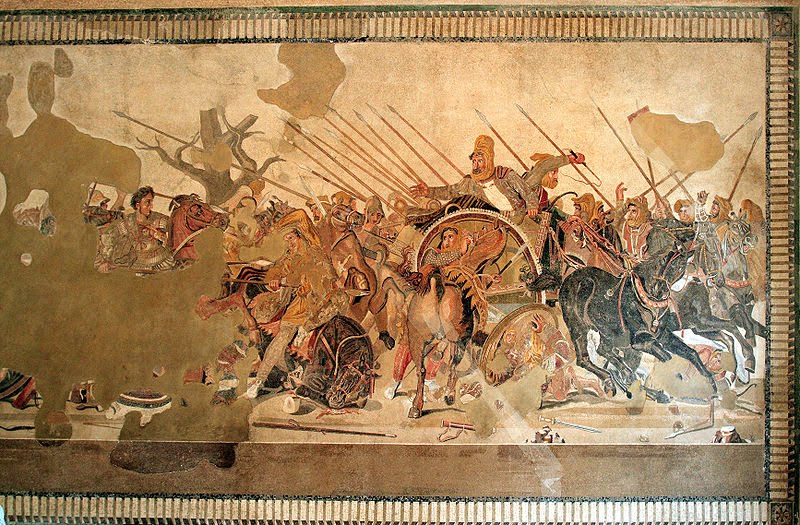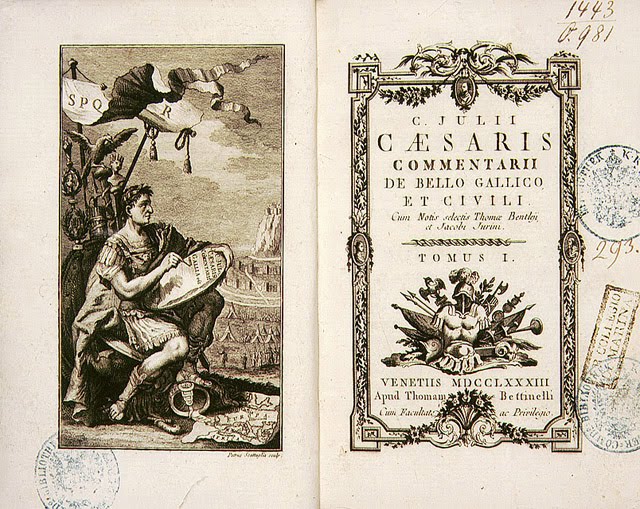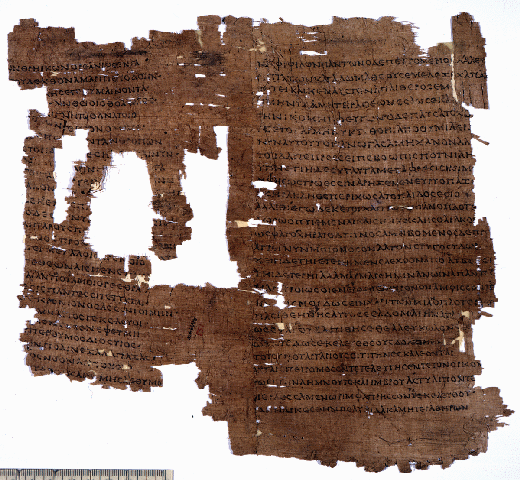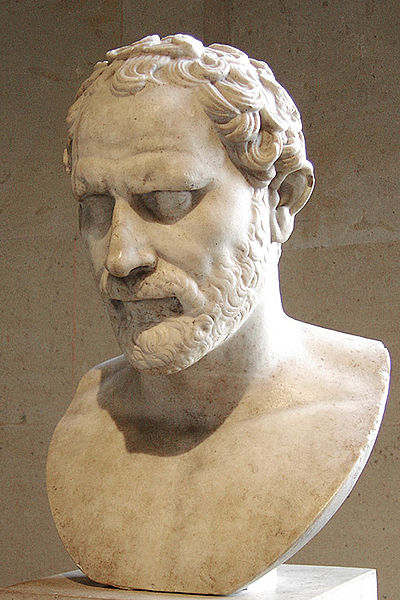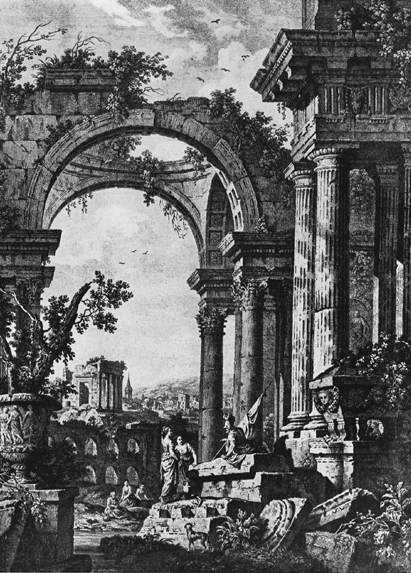1. The Euboean Discourse, or the Hunter (7)
The seventh Discourse belongs to the later period of Dio's life, as the reference to himself as an old man and the style show. It seems to have been delivered in Rome.
This Discourse falls naturally into two parts: first, the story of the simple hunters in the wilds of Euboea — a very popular one that at an early period was separated from the rest of the Discourse — second, a description of the life Dio would have the poor lead in the cities and the difficulties they have to contend with, and, finally, of the social evils that should be remedied.
The portrayal of the conditions in the country and in the cities of his time is very instructive for the historian who would become acquainted with that period of history and gain some insight into the causes that led to the downfall of the Roman Empire.
2. ΠΕΡΙ ΛΥΠΗΣ - За страданието (16)
Τὸ μὲν ὑφ᾽ Ἡδονῆς κρατεῖσθαι τοὺς πολλοὺς αἰτίαν ἴσως ἔχει· κηλούμενοι γὰρ καὶ γοητευόμενοι παρὰ ταύτῃ μένουσι·τὸ δὲ Λύπῃ δεδουλῶσθαι παντελῶς ἄλογον καὶ θαυμαστόν...
This Discourse, given in the form of an address (διάλεξις), would seem also to belong to the period of Dio's exile, because it was then that he needed the comfort which this discourse gives. He teaches the Stoic doctrine that since there are so many things in life to hurt us, we should fortify our spirits so as to be insensible to them.
Von Arnim draws attention to the fact that this Discourse, just like Discourses... begins by mentioning a common fault of ordinary men in order to combat it.
3. On Covetousness (17)
After saying by way of preface that men often know what is right, but still fail to do it and need to be admonished again and again, Dio proceeds to point out the evils that come in the train of covetousness, and the blessings that follow from contentment. In these strictures on covetousness he makes considerable use of that passage in Euripides' Phoenician Women where the poet speaks of the evils of ambition, thus apparently showing that he considered the two vices to be fundamentally one and the same.
4. ΠΕΡΙ ΑΝΑΧΩΡΗΣΕΩΣ - За оттеглянето от активен живот (20)
Τί γάρ ποτε τὸ τῆς ἀναχωρήσεώς ἐστι καὶ τίνας χρὴ τιθέναι τοὺς ἀναχωροῦντας; ἆρά γε τοὺς ἀπὸ τῶν προσηκόντων ἔργων αὐτοῖς καὶ πράξεων ἀφισταμένους, τούτους χρὴ φάσκειν...
Here Dio discusses the real meaning of 'retirement.' It does not consist in going away somewhere to avoid a duty or a danger, or even to get freedom from distraction. To retire in the true sense is to fix one's mind upon the things that truly matter and to disregard trivial things and distractions from without. Retirement from the haunts of men merely affords foolish and wicked men an opportunity to give themselves up to their foolish and wicked thoughts and to plan how they may make their imaginings come true. Nothing is said of the good use to which the good may put such retirement. The similarities between this Discourse and Seneca's fifty-sixth Letter led E. Weber to the conclusion that Dio and Seneca drew from a common Stoic or Cynic source.
Von Arnim, who maintains that Dio, with the disappearance of his anti-monarchical feelings, dropped the use of the word μόναρχοι, would place this Discourse in the reign of Domitian. We may be sure at any rate that it was not written in Dio's youth, when he was a sophist.
5. ΟΤΙ ΕΥΔΑΙΜΩΝ Ο ΣΟΦΟΣ - За това,че мъдрият е щастлив (23)
Δ. Πότερον δοκεῖ σοι εἶναι ἄνθρωπος εὐδαίμων, εἰ δὲ μή, γεγονέναι ἢ ἔσεσθαι, ἢ ἀδύνατον ἡγῇ τὸ τοιοῦτον περὶ ἀνθρώπου, ὥσπερ εἴ τις ἀθάνατον ἄνθρωπον λέγοι εἶναι;...
This is one of the twelve discourses that are in the form of a dialogue between Dio, the teacher, and one of his pupils, reported directly. It would appear to reproduce an actual experience of Dio's in which he sets forth the Stoic doctrine that only the wise man is happy.
The line of thought is as follows: Homer and Euripides have said that man is unfortunate and unhappy; but just the opposite is true, or rather, partially true. For each man has a fortune or guiding spirit; and if this fortune or guiding spirit is good, then the man is good-fortuned and happy. But if the man has a bad fortune or guiding spirit, then the man is bad-fortuned and unhappy. But if the guiding spirit is good in the sense that it gives good fortune, it is also good as meaning 'just and useful and sensible' — which is a non sequitur — and since it apparently gives its own qualities to the man who has it, this man is at the same time also just and useful and sensible, in other words, wise. The good δαίμων, to use the Greek word, being good in both senses, gives both happiness and wisdom. The two are inseparable.
Then the pupil raises the question as to whether any guiding spirit can be bad, since all are divine; and Dio admits that he has merely been accepting the popular belief, not following his own, in assuming that some guiding spirits are good and others bad. He really believes with the philosophers that all guiding spirits are good. If a man listens to his good and wise guiding spirit, he gets at one and the same time both happiness and wisdom; if he does not, he is both unhappy and a fool. Therefore, only the wise man is happy.
6. ΠΕΡΙ ΕΥΔΑΙΜΟΝΙΑΣ - За щастието (24)
Οἱ πολλοὶ ἄνθρωποι καθόλου μὲν οὐδὲν πεφροντίκασιν ὁποίους χρὴ εἶναι οὐδὲ ὅ τι βέλτιστον ἀνθρώπῳ ἐστίν, οὗ ἕνεκα χρὴ πάντα τἄλλα πράττειν...
This Discourse begins by saying that the majority of men act wrongly in respect to something and then proceeds to set them right. This same admonishing attitude is found also in Discourse 13, where Dio tells of the beginning of his 'preaching' activity during his exile. For this reason von Arnim believes that all these Discourses, except the last of course, belong to the period of Dio's exile.
The great majority of men, says Dio, select their occupation in life without first considering the important question of what the life of man should be, and what is the highest good for him, the ideal toward which he should strive. Only the man who knows what this highest good is and subordinates everything else to it can gain true success and happiness.
7. Melancomas II. The good die young (28)
Dio, accompanied by at least one friend, comes up from the harbour — of Naples presumably — to witness the athletic contests then being held, and has his attention drawn especially to a tall handsome boxer who is training, surrounded by a great crowd of admirers. On asking one of the bystanders who the man is, he learns that it is the boxer Iatrocles, so often the antagonist of Melancomas, who has recently died. This bystander speaks in the highest terms of Melancomas both as a boxer and as a man, and is evidently greatly distressed by his death. Thereupon Dio offers various reflections to comfort him.
Von Arnim comes to the conclusion that the occasion of it was the Games in honour of Augustus (Ludi Augustales) as held at Naples in the year A.D. 74, when Titus, soon to be emperor and now thirty-three years old — Dio himself would be of about the same age — was either Director of Games (γυμνασίαρχος) there or Exhibitor of Games (ἀγωνοθέτης).
On the other hand, Lemarchand gives various reasons for thinking that Melancomas is a purely imaginary character. He considers it rather remarkable that, apart from one passage in Themistius, who got his information from Dio, there is no other reference in ancient literature to this incomparable athlete and boxer, no inscription that has come to light commemorating any victory of his. He also shows in detail that this Melancomas is the embodiment of all the youthful qualities and virtues for which Dio shows admiration in other Discourses, and that Dio at times, as in the Euboean Discourse, describes what is ideal rather than actual. And in Dio's time, he adds, the Romans began to take an interest in athletics, so that outstanding athletes came from Greece and Asia Minor to give exhibitions — note that Melancomas' father is represented as coming from Caria in Asia Minor. Their contests served to recall the glorious past of Greece. Therefore, may not Dio, who was an ardent Hellenist and who looked with disapproval on the cruel gladiatorial exhibitions, have wished to increase the interest in athletics by creating and describing this ideal athlete, this gentle boxer, who would not think of injuring his opponent by striking him with his fist armed with the terrible caestus? But this gentleness would make little appeal to most men of Dio's time.
As a literary effort the twenty-eighth Discourse is superior to the twenty-ninth, and toward the end the hortatory and preaching element, which is regarded as typical of what Dio wrote during his exile, is somewhat in evidence. It is possible, then, that this Discourse was written considerably later than the following one.
8. Melancomas I. It's great to be a hunk, but better to be a decent person (29)
If we follow von Arnim and others in believing that there really was such a Melancomas and that this funeral oration really was delivered, then arises the question of who delivered it. Apparently it was not Dio himself, because the speaker had been a close friend of the deceased and was deeply moved by his death; while Dio, on the other hand, had known Melancomas only by name. Then too, the speaker represents himself as quite youthful and not a fluent speaker. But if Dio merely wrote the oration for some one else to deliver, who was that person? One thinks first of Titus, who according to a Neapolitan inscription was the agonothete at the Games in Naples three times and gymnasiarch once before A.D. 81 and was reputed to have been a lover of Melancomas. But it seems unlikely that a man of Titus' disposition, high place, and maturity — he was possibly thirty-three years old at the time when this oration is supposed to have been delivered — and fresh from the capture of Jerusalem, would have represented himself as youthful and immature; or have ranked athletics higher than warfare. It is more likely that this oration was delivered by a Greek who was a high official at the Games.
The thought content of this Discourse and the information given about Melancomas are practically the same as in the preceding Discourse; but a good deal more is said in praise of the deceased; and athletics, as already said, are put on a higher plane than warfare.
9. ΧΑΡΙΔΗΜΟΣ - Харидем (30)
(D.) Ἀκηκόειν μὲν καὶ πρότερον πρὶν ὑμᾶς ἰδεῖν πρὸ ἱκανοῦ περὶ τῆς Χαριδήμου τελευτῆς. εὐθὺς γὰρ ἐπυνθανόμην, ὡς παρέβαλον δευρί, περί τε ἄλλων τινῶν...
At the beginning Dio is speaking with a certain Timarchus and the younger of his two sons, also named Timarchus, about the death of the older son, Charidemus, who had had a great love and admiration for Dio. From the father Dio learns that Charidemus shortly before his death had dictated an address for the consolation of his father, brother, and friends. On learning this Dio at once urges the father to read the address to him and the father complies.
In this address three possible explanations of the life of man are offered. According to the first one, this world is a prison in which men are punished by the gods, who hate them because they are of the blood of the Titans. When any man's punishment is completed, or he has left a son to suffer punishment in his stead, he is allowed to escape by death. According to the second explanation, this world is a colony founded by the gods for men, their descendants, whom at first they kept under their protection, but afterwards allowed to shift for themselves. The third explanation represents this world as a beautiful palace where men are entertained at a banquet from which God summons to himself those who have comported themselves best.
After hearing this address Dio commends it highly and attempts to console the bereaved father and the younger son.
In form this Discourse is a dialogue, reported directly, which contains a verbatim report of Charidemus' address, which, in its turn, is made up almost entirely of indirect reports of what certain men, not definitely indicated, have said in explanation of man's life in this world. The important part of the Discourse is, of course, Charidemus's address, which gives these three explanations, while the conversation between Dio and the two bereaved ones is merely a framework to hold it. In Plato's Phaedo also, which according to Philostratus was Dio's favourite book on philosophy, the important part consists of the last words of Socrates as reported by Phaedo to his friend Echecrates. Corresponding to these last words of Socrates we have here the deathbed message of Charidemus. And further, Charidemus shows in the face of death the same fortitude and resignation that Socrates did.
But did such a person as Charidemus, Dio's ideal of a young religious philosopher, ever have an existence, as Socrates did; or have we merely a product of the imagination? von Arnim feels sure that he is a real character, while others are not so certain.
In the next place, can we identify the man who, Charidemus says, offered him the explanation that this world is a prison? Now is Charidemus crediting this 'morose man' with the first explanation as a whole, or only with the part beginning with § 20? If the latter is the case, and the 'wandering philosopher' is identical with the 'morose man,' then Dio himself answers fairly well to this description.
Once more, who is the 'peasant,' also mentioned in § 25, 'who spoke with a very rustic drawl and accent,' the one from whom Charidemus says he heard the second and third explanations?
But no matter how we identify the 'morose man' and the 'peasant,' it seems reasonable to suppose that the three explanations of life represent three stages in Dio's own belief. After returning from exile he naturally acquired a more cheerful outlook on life and came to think of the gods as merely having become indifferent to men, and then later the prison has become a beautiful palace in which the king of the gods gives royal entertainment to men and rewards the best. Yet some parts of Dio's belief did not change. He believed throughout that the gods exist, that they have something to do with man, and that man may overcome evil and receive his reward.
And finally, there is the question as to the immediate and the ultimate sources of these three explanations of life and this world. Of course, if we believe that Antisthenes, the founder of the Cynic sect, offered the first and Cleanthes the second and third, for us a good deal of the question is settled. If we do not, then there is a great uncertainty. However, it has been shown that the idea of the world as a prison is Pythagorean and Orphic in origin,1 while Friedrich Wilhelm has offered a good many reasons for believing that Dio drew upon Posidonius for parts of all three explanations, although he with others thinks that there is a large Cynic element in the third. And since there are some thoughts that can be paralleled in Xenophon and Plato, it is reasonable to suppose that Dio drew to some extent also from these, his favourite authors.
(J.W. Cohoon)
About the Latin Academy in the Vatican
13 years ago
